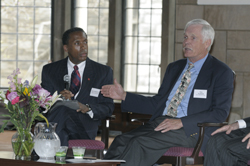|
“The growing trend for the industry to go green has not gone unnoticed by Temple University,” said Betsy Barber, associate dean of STHM. “Temple recently won the very prestigious Pennsylvania Waste Watcher Award in Philadelphia County for improving recycling in Tuttleman Learning Center as well as for its educational initiative in recycling. Temple’s recycling program has saved over 100,000 trees since it began in 1989.”
While Turner is most well-known for his work with cable television, he is also a prominent environmentalist. In 2002 he and McKerrow launched Ted’s Montana Grill, a restaurant chain that has made sustainable practices parts of its business plan.
With the slogan, “Eat great. Do good” and more than 50 restaurants in 19 states, the chain serves as a model for restaurants that are looking to show how they are socially conscious by going green, DeShields said. “When I visited your restaurant here in Philadelphia I learned about the great lengths the chain has undergone to make sure everything used is biodegradable and environmental friendly,” DeShields said.
“In the restaurants there is no Styrofoam, no plastic, and everything is recyclable,” McKerrow said. In order to accommodate guests who want straws, Ted’s Montana Grill stocks biodegradable paper straws, which are available only upon request. Saying they are unnecessary, Turner said he wouldn’t mind taking the straw policy one step further and doing away with the straws.
While the discussion ranged from population control and women’s rights to the scarcity of natural resources and energy efficiency, the overall message was clear — sustainability will be a key to success in the future. “We must make it a part of the way we think and part of our corporate culture,” McKerrow said.
Turner and McKerrow emphasized that this does not mean simply investing in environmentally friendly products. Being sustainable includes everything from asking a franchiser to buy “green” to talking with community leaders to help create an infrastructure for recycling.
—Written for the School of Tourism and Hospitality Management by Laura Stein
|
